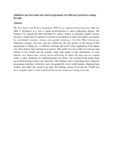Please use this identifier to cite or link to this item:
https://cris.library.msu.ac.zw//handle/11408/1784Full metadata record
| DC Field | Value | Language |
|---|---|---|
| dc.contributor.author | Nyawo, Vongai Z. | - |
| dc.date.accessioned | 2016-09-05T07:37:30Z | - |
| dc.date.available | 2016-09-05T07:37:30Z | - |
| dc.date.issued | 2014 | - |
| dc.identifier.issn | 1818-6874 | - |
| dc.identifier.uri | http://hdl.handle.net/11408/1784 | - |
| dc.description.abstract | The Fast Track Land Reform Programme (FTLP) was implemented between July 2000 and 2002 in Zimbabwe as a way to speed up distribution of land to indigenous people. The manner of its launch has been described by various writers as jambanja (chaotic action), mayhem, violent chaos or agrarian revolution as distribution of land in this phase was marked by considerable coercion, violence and general lawlessness. Post this Third Chimurenga (liberation struggle), however, dust has settled and the true picture of the impact of this programme is coming out. As different historians and critics write, experiences of this phase vary from farm to farm and person to person. This article sets out to find out successes and failures of the FTLRP and the position today with regard to land distribution. In some districts, new farmers have settled and are producing. In others, the chaos has not stopped while, in some, challenges of a different nature have arisen. The research for the article made use of both desktop research and interviews. The desktop work covered huge areas where the programme took place. Interviews were also granted by newly settled farmers, displaced farm workers and others who failed to get land. The findings largely reveal that the FTLRP was not a complete failure. It had weaknesses but success stories are starting to be told. | en_US |
| dc.language.iso | en | en_US |
| dc.publisher | University of South Africa Press | en_US |
| dc.relation.ispartofseries | International Journal of African Renaissance Studies;Vol. 9(1); p.36-49 | - |
| dc.subject | Agrarian revolution; empirical studies on land reform | en_US |
| dc.subject | Empowerment of women; Lancaster House Agreement; Third Chimurensa; Zimbabwe Fast Track Land Reform Programme | en_US |
| dc.title | Zimbabwe post-fast track land reform programme: the different experiences coming through | en_US |
| dc.type | Article | en_US |
| item.openairetype | Article | - |
| item.languageiso639-1 | en | - |
| item.cerifentitytype | Publications | - |
| item.openairecristype | http://purl.org/coar/resource_type/c_18cf | - |
| item.grantfulltext | open | - |
| item.fulltext | With Fulltext | - |
| Appears in Collections: | Research Papers | |
Files in This Item:
| File | Description | Size | Format | |
|---|---|---|---|---|
| Zimbabwe post.pdf | Abstract | 6.4 kB | Adobe PDF |  View/Open |
Page view(s)
146
checked on Jan 24, 2026
Download(s)
22
checked on Jan 24, 2026
Google ScholarTM
Check
Items in MSUIR are protected by copyright, with all rights reserved, unless otherwise indicated.



